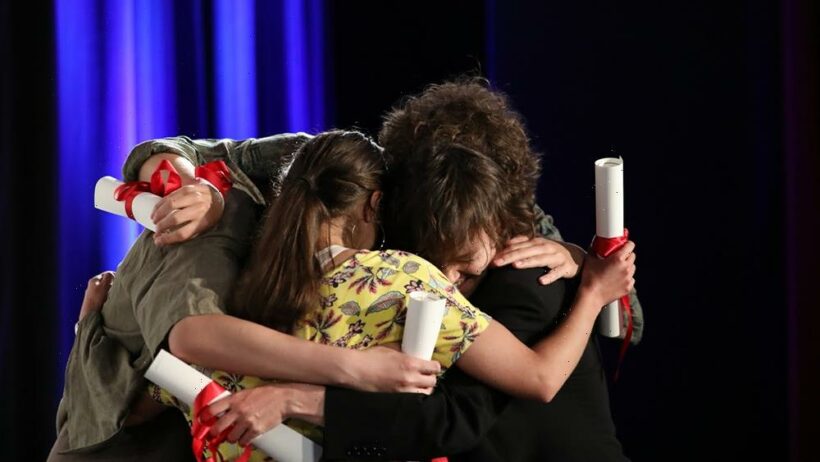Italy’s Valerio Ferrara was named the winner of the 25th edition La Cinef for his warm take on a hapless barber who believes in conspiracy theories in “A Conspiracy Man” (“Il Barbiere Complottista”). Laughing stock of his family, nobody takes him seriously. Until he is arrested by the police.
“Personally, I have a special affection for the cinema of this country,” said Canadian actor Monia Chokri, praising the director’s sense of humor. The film hails from Centro Sperimentale di Cinematografia.
“Comedy, as a genre, is undervalued at festivals. And yet, from making comedies myself, I know it’s the most difficult one. It’s a cutthroat genre: you either laugh or you don’t. We all laughed spontaneously,” she added.
“You are crazy! All of you! Oh, my God,” exclaimed the filmmaker at the prize ceremony on Thursday evening.
“Comedy is always viewed as something that’s not serious. But the first thing I said to my team, all of whom are here, was that it really is. In Italy, we have a long tradition of serious comedies. It’s just such an honor to win, and to win with a comedy.”
The short films and La Cinef jury – presided by Egyptian director Yousry Nasrallah and featuring Chokri, “Playground” helmer Laura Wandel, actor and director Félix Moati and French journalist Jean-Claude Raspiengeas, awarded three other prizes.
“I am very angry because there were no porn films [in the selection],” said Nasrallah, kickstarting a light-hearted celebration.
Li Jihae’s “Somewhere” (“Di Er,” from China’s Hebei University of Science and Technology School of Film and Television) received the second trophy of the evening.
“We want to award a filmmaker who believes in spectators, in cinema, in the landscape and the characters he is filming,” said the jury, while the happy director promised the audience to “learn English” following his win.

Third prize went to two films: “Humans Are Dumber When Crammed Up Together” (“Les Humains sont cons quand ils s’empilent”) by Laurène Fernandez (La CinéFabrique) and Masha Novikova’s “Glorious Revolution.”
In her delightful stop-motion animation, Fernandez takes on various neighborhood struggles with “mischief” and “amused cruelty,” said the jury.
“I am very proud to be called mischievous,” the filmmaker noted, thanking her crew and her protagonists.
Novikova’s “Glorious Revolution” returns to the Ukrainian revolution of 2014. A mother loses her son, killed during the protests, but her attempt to bury him as a hero soon clashes with a corrupt bureaucratic system.
The jury admitted to being “very impressed by the movie and by this mother, revolting against injustice and the ruling powers,” said Jean-Claude Raspiengeas.

“You killed me,” replied the visibly touched Ukrainian director, falling to the floor and struggling to find the words.
The film, developed at the London Film School, wasn’t the only one hailing from the U.K., as Mai Vu combined family issues and traditional Vietnamese cooking in “Spring Roll Dream” (NFTS).
This year, La Cinef has selected 13 live-action and three animated shorts from among the 1,528 titles submitted by film schools from all over the world. Four of them represent schools taking part for the first time. As observed by the organizers, “the shorts, made by six men and ten women coming from four continents, reflect the diversity of filmmaking education in the world.”
Dimitra Karya, artistic director of La Cinef selection, told Variety that she was “delighted” with a large number of female directors this year.
NYU was represented by “The Pass,” directed by Pepi Ginsberg, establishing a sense of threat as an innocent-looking summer encounter in a beautiful place goes sour, leaving its protagonist, Ben, afraid to get out of the water. There is a stranger waiting for him, saying he “likes to watch.”
In Denmark’s humorous yet heartbreaking “That’s Amore” (“100% Flået Kærlighed”), director Malthe Saver set out to explore every couple’s worst nightmare: What if one day, or even during a romantic getaway, you suddenly just fall out of love? The film, coming from Den Danske Filmskole, was inspired by the claim that love consists of 20% feelings and 80% willpower.

Bianka Szelestey’s “Craze” (“Hajszálrepedés”) – Eötvös Loránd University Department of Film Studies – also dealt with a darker side of relationship, as a woman finds out her partner wants to break up with her – right before dinner.
Olga Kłyszewicz brought her animation “We Are Not There Tomorrow” (“Jutro nas tam nie ma”) to Cannes. The film was made in The Polish National Film School in Łódź. In Orin Kadoori’s “Kinship” (“Sheherut,” The Steve Tisch School of Film & Television Tel Aviv), a young girl explores new boundaries in a relationship with her widowed father. Li Yingtong turns on a teenage loner working in a convenience store in “The Silent Whistle” (“Feng Zheng,” Emerson College).
In “Mum Life,” Australian director Ruby Challenger (AFTRS) decided to focus on early motherhood. Family issues were also explored in Alica Bednáriková’s “Liquid Bread” (“Chlieb náš každodenný,” from TF VŠMU-Film and Television Faculty), where a family of three generations meets under one roof, but an unexpected visit disrupts their peaceful routine.
In “Mistida,” Falcao Nhaga (ESTC) focuses on an immigrant mother, hurting from a backache, calling for her son to help carry her groceries. “All of This Belongs to You” (“Tout ceci vous reviendra”) by Lilian Fanara (La Fémis) was also featured, as well as Whistling Woods International’s “Nahua” by Pratham Khurana.
Cannes Film Festival allocates a €15,000 ($16,050) grant for the first prize, €11,250 ($12,038) for the second and €7,500 ($8,025) for the third.

Source: Read Full Article
